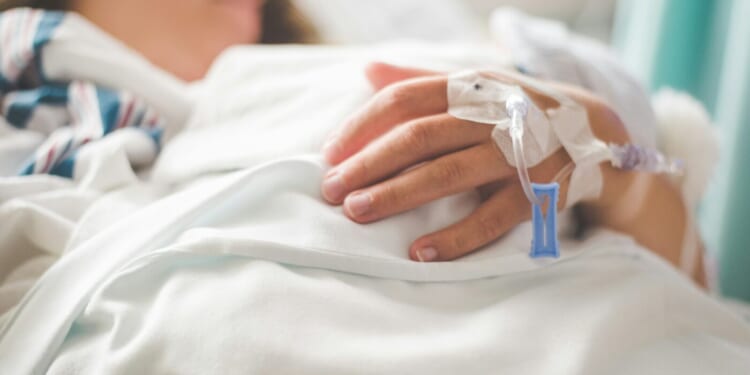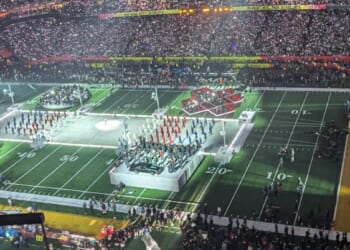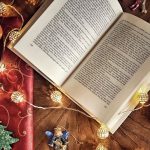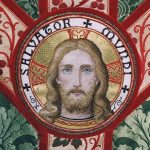Last week, I planned to go grocery shopping with my daughter. It was a gray, fall afternoon. I sat down in the driver’s seat about to back out of the driveway when my whole world started spinning.
Thanks be to God I had not started driving. Things kept spinning, off and on, for over a week. At times, they’re still spinning. Vertigo. In an instant, driving became dangerous for my daughter and me, as well as anyone else on the road, should I have a vertigo attack behind the wheel.
I remember my mom going through something similar. Turns out, so did my grandmother. I’ve discovered a multi-generational struggle with vertigo in my family.
After the initial experience of spinning, I sat in a dimly lit emergency room hallway in a recliner with an IV in my arm. Ahead of me in similar hospital recliners were three other women with different ailments—each of us getting a glimpse of the decline in medical care that has been a reality since COVID.
Thankfully, my heart is good, and my brain CT showed no strokes, bleeds, or tumors. While I was laying in the CT machine, the machine spun and vibrated loudly, which sent me spinning while my eyes were closed. Something going on in my right ear, or possibly both ears, is causing the issue, just like my mother and grandmother. I’ll know more when I get to the specialist today.
In the spiritual life, the Lord calls us to mortification. There are entire programs, such as Exodus 90, designed to help Catholics learn more about the ascetical life in an age of hedonism and spiritually destructive abundance. These are all well and good. They serve an important purpose in helping us strip away that which keeps us from God. They lead to a necessary poverty that allows us to be filled by God. However, they are not the most effective means of growth; the saints understood that it is unwilled suffering that is the most effective.
The Lord allows each one of us to suffer in different ways in order to help us draw more closely to Him. He allows illness, accidents, lost jobs, and broken relationships to empty us of our willfulness and desire for control. In Episode 34 of Desert Fathers with Bishop Erik Varden: Living with Infirmity, he shares the following quote from Blessed Syncletica:
Should we be troubled by illness, let us not be downcast if, because of illness or our stricken body, we cannot stand upright praying or sing Psalms aloud. All these things were given us in order to accomplish the purification of our desires. Fasting and sleeping on the floor were prescribed for us on account of [the attractions of] shameful pleasures. If sickness blunts these, the exercises turn out to be superfluous. Why do I say superfluous? Because our destructive tendencies are calmed by sickness as if by a greater, more powerful remedy. This is the really great ascesis: to hold out patiently in sickness and to bring forth hymns of thanksgiving to the Almighty. Is eye-sight taken from us? Let us not be weighed down. We may lose the physical organs of greed, but with our inward eyes we see the glory of the Lord as in a mirror. Are we turning deaf? Let us give thanks that we are made inaccessible, once for all, to vain chatter. Are our hands limp? Our inward hands are no less well prepared for battle against the enemy. Is our body fully in the grip of exhaustion? The inner man will know an increase of good health.
Periods of illness tend to grind us to a halt and test our faith. Our plans are revealed for the dust they really are, as the Lord slows us down so He can work more deeply within our souls. We love the Lord when He gives us what we want, when He is more Fairy Godmother than Eternal Father. We can praise Him in abundance, but will we do so in the desert of illness? Can we truly say, with Job: “Naked I came forth from my mother’s womb, and naked shall I go back there. The LORD gave and the LORD has taken away; blessed be the name of the LORD! (Job 1:21)”? Do we truly want the Lord both in season and out of season?
This is the challenge. I have a family, and I serve in campus ministry. Some days I am barely able to leave my bed without spinning. On other days, I am able to go for a walk with my family and attend Mass. No two days are the same right now. The Lord has taken away my control and freedom. He’s taken away my ability to drive. I am totally dependent on my husband and friends.
I sat alone in the ER because my husband was 8 hours away on a business trip. One of my friends had to drop me off and take my daughter with her back to her house. Hours later, after the ER physician ruled out anything life-threatening, I found myself trying to find a ride home as friend after friend didn’t answer the phone or was busy. I wondered if I would have to take an Uber. One of my spiritual daughters finally answered and was able to pick me up. Walking out of the ER revealed to me how alone I am in the world and how much I am totally dependent on God.
Periods in our lives like this, especially when they come on the heels of other tragedies, in my case the death of my father and near death of my mother, are a major test of faith. It can feel like one beating after another. The moment we get back up, the next suffering comes. Each wave of suffering is overwhelming. It is only through the Lord bringing us to stillness and silence that we can begin to discover what it’s all for. Sometimes He has to grind everything to a halt so we will turn more readily to Him.
Illness is an aspect of the Fall, but it is also used by the Divine Physician as a healing remedy in areas of our lives where we still need to be purified of willfulness, pride, and faithlessness. When we find ourselves totally dependent on others and unable to do the tasks we are responsible for each day, we are forced to confront our weaknesses and lack of control. The Lord wants us to come to see that He is the Lord of our lives, not us. In a world predicated on nihilism and power, this spiritual lesson is absolutely essential, or we may be totally lost. Illness is a place where we can grow through a total surrender to God’s plan rather than our own.
This infirmity will last as long as the Lord ordains. During that time, I will be forced to rely on my husband and others in order to continue to serve the people I am responsible for, but through it, the Lord is guiding me to deeper freedom. He is asking me to stop clinging so tightly to my own ways, so that I can open my hands to receive the required piercing nails of this life. Those nails are the path to sanctity and freedom.
We live in a time when illness is seen as the greatest evil. For those who embrace it, the aesthetic life can be lived to the fullest without cold showers and sleeping on the floor. Not because those practices aren’t good, but because they are lower in the spiritual hierarchy than the sufferings the Lord directly allows within our lives for our own sanctification. Unwilled suffering offered freely to the Lord is more powerful than anything we choose freely.
When I look at old photos of my father, I see a hidden light in his eyes that grew in the last two years of his life. He was chronically ill and had to give up practicing law in his early 50s in order to live the rest of his days largely homebound. It was a great trial for him, and this loss of freedom led to some of his deepest sufferings. In the end, however, I see a quiet freedom he achieved when he surrendered it to the Lord through long years of effort. I see a light in him that is known by the Mystics. I cannot confirm this since my father is now dead, but I see it in the precious last photos I have of him.
Illness and infirmity are an invitation to go deeper into the Most Sacred Heart of Jesus poured out on the Cross. It can be a time of tremendous spiritual growth that we cannot achieve by our own endeavors and chosen mortifications. Our surrender is the most powerful mortification. We cannot find true freedom until we surrender.
For all those enduring unwilled suffering, may we learn to surrender to Him so that we can grow more like Him and find the joy that is beyond all understanding.
Photo by Stephen Andrews on Unsplash










